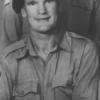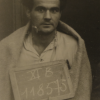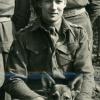In January 1941 a group of sixty guardsman arrived at Achdalieu for Commando training along with contingents from the South Wales Borderers and Lancashire Fusiliers.
The group from the Grenadier Guards was put under the charge of Lt Arthur Kellas who refererred to them as “big sturdy men: Sergeant White, strong and broad with a fat red countenance and richly curling whiskers, as if he had been brought up on porridge and cream; Lance Corporal Cadwallader, whose face is as wide as a Chinamans, rosy cheeks, punched nose, fair hair; Lance Corporal Rayment, tall as a lamp post, a ginger haired policeman; Guardsman Saunders, the joker of the detachment, six foot three inches, a professional wrestler; Sergeant Whitley, just twenty years old, brisk and fresh, full of energy, who answers only with a terrific salute, ‘Sa’….’Sa’…..’Sa’; Guardsman Samborne, a gentleman, with spectacles, for enigmatic reasons in the ranks; Corporal Brown, another policeman; Sergeant Betts, picture of a soldier; Guardsman Miles, the butcher….’ With those large men at my command I felt like King Frederick William of Prussia with this Guards."
Kellas later recalled “Our most strenuous exploit at that time was the ‘Pemmican March’, three day’s journey in foul February sleet by Glen Dessary to Loch Nevis and the West coast and back through Fedden. The object was a test of endurance on a diet of pemmican, ‘that pelican or pemmican stuff’, as it was known to the troops, experimental slabs of synthetic nourishment which could be eaten raw like chocolate, or crumbed and cooked like oatmeal, or fried, or chopped up and stewed, according to taste and convenience. On the Pemmican March a column of fifty two men took an old trail through the most desolate highland country in Scotland where no British troops can have been since the Redcoats were after Bonnie Prince Charlie, two hundred years ago.
"As we straggled above Glen Garry on the second day of this campaign, clambering over rocks and floundering in bog, soaked and weary, splashing through rivers in spate and the spray flying, even that sturdy Yorkshireman Duncan, out of the wool business in Bradford, was flagging. In the event it should be confessed that the pemmican ration was supplemented by more illicit venison, a hind brought down by a fusillade on the first evening as we came over the pass in the rain to the sea at Loch Nevis; although indeed most of the men were too tired that night to eat anything, and fell asleep at once in a damp peat-shed at Finiscaig, the Black Place. ‘Got pless them’, said the old lady there in her soft Highland tone, when she had recovered from her fright to see a column of soldiers come down from the rocks, drenched to the skin, in the dark. ‘Sure it iss a far, far way they are after coming, the poor dear souls.’
"On the afternoon of the third day, an hour and a half late for inspection at the Castle by Colonel Stockwell and Colonel Jackson, the parachute commander, forty exhausted men formed up in the wet fir forest in the Dark Mile near Achancarry, discharged a ‘feu de joie’ to clean the rust of their rifles, and marched into the park in indestructibly high spirits, to the sound of Martin’s mouth organ. ‘If its thinkin in your inner heart braggart’s in me step, you’ve never smelt the tangle of the Isles….’ A dozen others limped home later on their own.
"Colonel Jackson was looking for more men for his No 2 (Parachute) Commando. For, whilst we were playing at soldiers in the Rough Bounds, some thirty five of his troops, having blown up an Italian aqueduct, brave men on a mad assignment, were hopelessly struggling through the Apennines towards the coast, which they never reached, trusting to be recovered by submarine which wasn’t there. They were taken prisoner in chains to Naples. So there was plenty room for more desparadoes to fill their empty places.
"A few days hence the contingent left the centre to join that first parachute unit of the British Army in Cheshire. I was touched to be presented with a pipe and tobacco, ‘to Mr Kellas , or Killus’, and was glad to find those Grenadiers again soon after when I joined the unit myself. For a shared discomfort like the Pemmican March makes friends; and the worse the conditions the better the friendship, mysterious product of adversity.”
Thus Kellas' detachment of Grenadier Guards and trainee Commandos formed the nuclues of L Troop 11 SAS Battalion.
Quoted text from Arthur Kellas' book 'Down to Earth' ISBN 0-946270-91-0
A short account compiled from the work of Arthur Kellas
Read More




Latest Comments
There are currently no comments for this content.
Add Comment
In order to add comments you must be registered with ParaData.
If you are currently a ParaData member please login.
If you are not currently a ParaData member but wish to get involved please register.